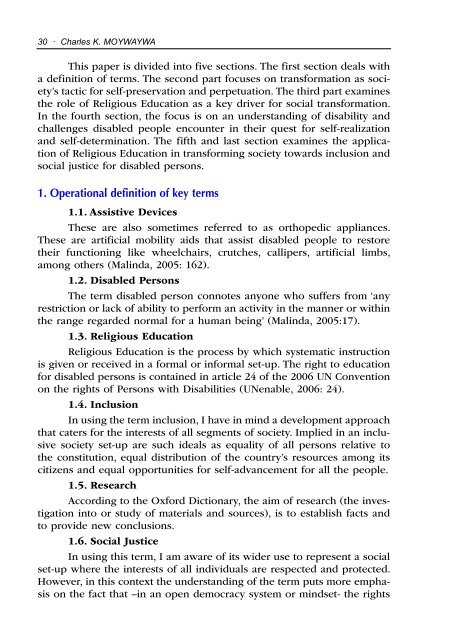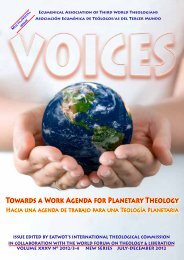voices-2013-2&3 - EATWOT's International Theological Commission
voices-2013-2&3 - EATWOT's International Theological Commission
voices-2013-2&3 - EATWOT's International Theological Commission
Create successful ePaper yourself
Turn your PDF publications into a flip-book with our unique Google optimized e-Paper software.
30 · Charles K. MOYWAYWAThis paper is divided into five sections. The first section deals witha definition of terms. The second part focuses on transformation as society’stactic for self-preservation and perpetuation. The third part examinesthe role of Religious Education as a key driver for social transformation.In the fourth section, the focus is on an understanding of disability andchallenges disabled people encounter in their quest for self-realizationand self-determination. The fifth and last section examines the applicationof Religious Education in transforming society towards inclusion andsocial justice for disabled persons.1. Operational definition of key terms1.1. Assistive DevicesThese are also sometimes referred to as orthopedic appliances.These are artificial mobility aids that assist disabled people to restoretheir functioning like wheelchairs, crutches, callipers, artificial limbs,among others (Malinda, 2005: 162).1.2. Disabled PersonsThe term disabled person connotes anyone who suffers from ‘anyrestriction or lack of ability to perform an activity in the manner or withinthe range regarded normal for a human being’ (Malinda, 2005:17).1.3. Religious EducationReligious Education is the process by which systematic instructionis given or received in a formal or informal set-up. The right to educationfor disabled persons is contained in article 24 of the 2006 UN Conventionon the rights of Persons with Disabilities (UNenable, 2006: 24).1.4. InclusionIn using the term inclusion, I have in mind a development approachthat caters for the interests of all segments of society. Implied in an inclusivesociety set-up are such ideals as equality of all persons relative tothe constitution, equal distribution of the country’s resources among itscitizens and equal opportunities for self-advancement for all the people.1.5. ResearchAccording to the Oxford Dictionary, the aim of research (the investigationinto or study of materials and sources), is to establish facts andto provide new conclusions.1.6. Social JusticeIn using this term, I am aware of its wider use to represent a socialset-up where the interests of all individuals are respected and protected.However, in this context the understanding of the term puts more emphasison the fact that –in an open democracy system or mindset- the rights





